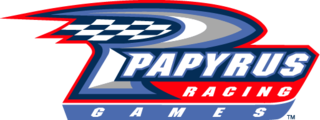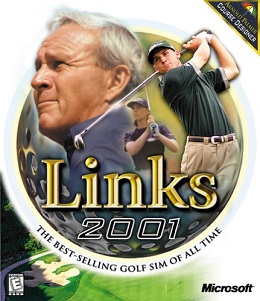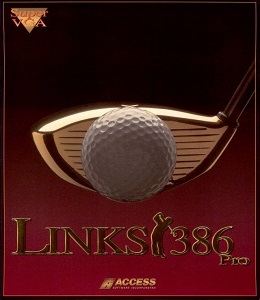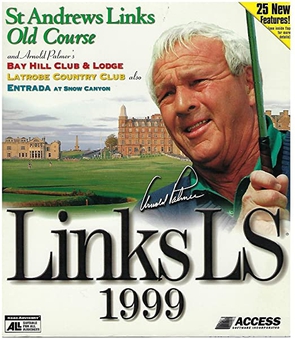Related Research Articles

Papyrus Design Group, Inc. was a computer game developer founded in 1987 by David Kaemmer and CEO Omar Khudari. Based in Watertown, Massachusetts, it is best known for its series of realistic sim racing games based on the NASCAR and IndyCar leagues, as well as the unique Grand Prix Legends. Papyrus was acquired by Sierra On-Line in late 1995 and Omar Khudari left Papyrus soon after that. Dave Kaemmer left Papyrus in late 2002, just before the release of NASCAR Racing 2003 Season (NR2003).

Access Software, Inc. was an American video game developer based in Salt Lake City, Utah. Founded in November 1982 by Bruce Carver and Chris Jones, the company created the Beach Head, Links and Tex Murphy series, as well as Raid over Moscow. Access Software was acquired by Microsoft in April 1999, transitioning in name twice before being acquired by Take-Two Interactive in October 2004, receiving the name Indie Built. In January 2005, Access Software became part of Take-Two's 2K label. Following a poor financial performance at Take-Two, Indie Built was closed down in May 2006.

Monster Truck Madness is a racing video game developed by Terminal Reality and published by Microsoft. It was released in North America on September 9, 1996. The game has twelve monster trucks and tasks the player with beating computer opponents. Checkpoints, multiple hidden shortcuts, and interactable objects commonly appear in the tracks. In the garage, the player modifies the truck to account for terrain surfaces. Online multiplayer is accessed with a modem, a local area network (LAN), or TCP/IP.
MKS Toolkit is a software package produced and maintained by PTC that provides a Unix-like environment for scripting, connectivity and porting Unix and Linux software to Microsoft Windows. It was originally created for MS-DOS, and OS/2 versions were released up to version 4.4. Several editions of each version, such as MKS Toolkit for developers, power users, enterprise developers and interoperability are available, with the enterprise developer edition being the most complete.

NASCAR Racing 2 is a video game developed by Papyrus Design Group and published by Sierra On-Line for Microsoft Windows and MS-DOS in late 1996. The game had an expansion, called NASCAR Grand National Series, released in late-1997.
Bruce Eugene Carver was a co-founder of Access Software in 1982. It began by producing titles for 8-bit computers, including Beach-Head, Beach Head II: The Dictator Strikes Back, Raid over Moscow and many others.
The AFL video game series is a series of Australian rules football video games licensed and based on the VFL/AFL.

Links 2001 is a golf-based sports simulation game developed by Access Software and Microsoft Games Group and published by Microsoft. It is part of the Links series and follows Links LS 2000. It is the first game in the series to include a golf course designer, allowing the player to create custom courses. It also features Arnold Palmer, Sergio García, and Annika Sörenstam as playable golfers.

Links LS 1997 is a golf video game developed and published by Access Software for DOS. It was released in 1996, and is part of the Links video game series, following Links 386 Pro (1992). It was followed by Links LS 1998.

Links 386 Pro is a golf simulation sports game for MS-DOS released in 1992. It is part of the Links series, and was developed by Access Software as the follow-up to Links: The Challenge of Golf (1990). A Macintosh version, Links Pro, was released in 1994. An enhanced version called Links 386 CD was released for PC in 1995 that included audio comments by comedian Bobcat Goldthwait acting as the player's caddie, and an aerial flyby of each hole streamed from the game's CD-ROM. Re-branded versions of the game were also released for Microsoft Windows under the titles Microsoft Golf 2.0 (1994) and Microsoft Golf 3.0 (1996), part of the Microsoft Golf series.

Links LS 1998 is a golf video game developed and published by Access Software. It is part of the Links video game series, following Links LS (1996). It was released in 1997, and is the first game in the series to be published for Microsoft Windows. The game was well received, and was followed by Links LS 1999.

Links LS 1999 is a video game developed and published by Access Software for Microsoft Windows in 1998, and is part of the Links video game series.
Jack Nicklaus is a series of golf video games named after golfer Jack Nicklaus. The first game, Jack Nicklaus' Greatest 18 Holes of Major Championship Golf, was developed by Sculptured Software and published by Accolade. It was released for various platforms beginning in 1988. Accolade would publish subsequent games in the series for the next decade, before selling the rights to Activision in 1998. Activision published a sixth game in the series, Jack Nicklaus 6: Golden Bear Challenge, in 1999, but chose not to publish a sequel due to poor sales. The next game in the series, Jack Nicklaus Perfect Golf, was released by a new company in 2016.

Links: The Challenge of Golf is a golf video game developed by Access Software. It was published for MS-DOS in 1990, followed by the Amiga in 1992. A Sega CD version, developed by Papyrus Design Group, was released in 1994. It is the first game in the Links series, and was followed by Links 386 Pro (1992). A Microsoft Windows version, titled Microsoft Golf, was released in 1992 as the first game in the Microsoft Golf series.

Microsoft Golf 2001 Edition is a 2000 golf video game developed and published by Microsoft for Microsoft Windows. It is the final game in the Microsoft Golf series, and the successor to Microsoft Golf 1999 Edition. It uses the same game engine as Links LS 2000 (1999), part of Microsoft's Links series of golf games.

Links LS 2000 is a golf video game developed by Access Software and published by Microsoft. It is part of the Links series and was released in 1999 for Microsoft Windows, and in 2000 for Macintosh. It was followed by Links 2001.

Microsoft Golf 1998 Edition is a 1998 golf video game developed by American studio Friendly Software and published by Microsoft for Microsoft Windows. It is the fourth game in the Microsoft Golf series, following Microsoft Golf 3.0. The game uses a revamped design that is substantially different from its predecessors.

Microsoft Golf 1999 Edition is a golf video game developed by American studio Friendly Software and published by Microsoft for Microsoft Windows. It was released in the United States in late 1998. It is the fifth game in the Microsoft Golf series, following Microsoft Golf 1998 Edition, which was also developed by Friendly Software.

Links Extreme is a 1999 golf video game developed by Access Software and published by Microsoft for Microsoft Windows. It is the first game in the Links series to be published by Microsoft, which purchased Access Software a month prior to the game's release.

PGA Championship Golf 1999 Edition is a 1999 golf video game developed by Headgate Studios and published by Sierra Sports for Microsoft Windows. The game includes eight golf courses and a golf swing method known as TrueSwing, which uses the movement of the computer mouse to simulate a golf swing in real-time as the player makes the shot. Also included is the ReadyPlay feature, allowing golfers in a multiplayer group to play at their own pace without waiting for others to finish their turn. The game was praised for its variety, including its TrueSwing and ReadyPlay features, although its golf commentary was criticized. The game was followed by a sequel, PGA Championship Golf 2000.
References
- ↑ Staff (November 1991). "Computer Gaming World's 1991 Games of the Year Awards". Computer Gaming World. No. 88. Golden Empire Publications, Inc. pp. 38–40, 58.
- ↑ Devil's island course expansion on GameSpot
- ↑ Davis Love III golfer expansion from TheComputerShow.com
- ↑ Sengstack, Jeff (August 15, 1996). "Links LS". GameSpot. Archived from the original on December 12, 2004.
- ↑ Robinson, Jon (March 29, 2004). "Game Over". IGN. pp. 1–2. Archived from the original on June 5, 2004.
- ↑ Feldman, Curt (December 17, 2004). "Take-Two helps Microsoft get out of sports game". GameSpot . Retrieved July 19, 2019.
- ↑ GamesIndustry International (December 17, 2004). "Microsoft sells off sports game studio to Take Two". Eurogamer . Archived from the original on December 4, 2011.
- ↑ "Golf Simulators - Indoor Virtual Golf & Software - TruGolf". TruGolf.
- ↑ Links: The Challenge of Golf at MobyGames
- ↑ Links Extreme comment at Games.net
- ↑ Microsoft LPGA Press Release Archived 2009-03-26 at the Wayback Machine
- ↑ Links 2003 comment Archived 2007-10-11 at the Wayback Machine at GameNationTV.com
- ↑ Links 2003 Championship Edition Press Release Archived 2009-03-26 at the Wayback Machine
- ↑ Links 2004 review Archived 2007-10-12 at the Wayback Machine at ArmChairEmpire.com
- ↑ Links Golf Courses Library at LangKong.com Archived July 13, 2011, at the Wayback Machine
- ↑ May, Scott A. (April 1997). "Links Lite: Microsoft Golf 3.0 Levels the Field for Win 95 Golfers". Computer Gaming World. p. 112.
- 1 2 Lackey, Jeff (June 19, 1998). "Microsoft Golf: 1998 Edition". Computer Games Strategy Plus. Archived from the original on April 18, 2003.
Microsoft's golf sims in the past could be best described as "Links Lite": they were basically slightly modified versions of the venerable Links series.
- ↑ May, Scott A. (October 1998). "Swing Time! Microsoft Steps Out of LINKS Shadow With a Decent New Golf Game". Computer Gaming World. p. 260.
Licensed from Access Software, versions 1-3 were essentially LINKS LITE [...]
- ↑ Rosano, Paul (July 12, 1998). "Microsoft's 'Golf' Has Handicaps". Hartford Courant. Retrieved June 20, 2019.
- ↑ House, Michael L. "Microsoft Golf 1999 Edition review". AllGame. Archived from the original on November 15, 2014. Retrieved June 20, 2019.
- 1 2 McDonald, T. Liam (February 17, 1999). "Golf 1999". GameSpot. Archived from the original on October 5, 2003.
[...] previous incarnations of Microsoft Golf were essentially Links Lite for Windows.
- ↑ Products Archived 2009-03-25 at the Wayback Machine
- ↑ "Links LS 1999". GameRankings. Retrieved July 19, 2019.
- ↑ "Links Extreme". GameRankings. Retrieved July 19, 2019.
- ↑ "Links LS 2000". GameRankings. Retrieved July 19, 2019.
- ↑ "Links 2001". Metacritic. Retrieved July 19, 2019.
- ↑ "Links 2003". Metacritic. Retrieved July 19, 2019.
- ↑ "Links 2004". Metacritic. Retrieved July 19, 2019.
- ↑ "The 15 Most Innovative Computer Games". Computer Gaming World. November 1996. p. 102. Retrieved 25 March 2016.
- ↑ "Top 100 Games of All Time". Next Generation . No. 21. Imagine Media. September 1996. p. 47.
- ↑ Rosano, Paul (February 13, 2000). "The Best Don't Always Sell". Hartford Courant . Archived from the original on April 2, 2018.
- 1 2 Edge Staff (August 25, 2006). "The Top 100 PC Games of the 21st Century". Edge . Archived from the original on October 17, 2012.
- ↑ Morris, Dan (March 2003). "The Ninth Annual PC Gamer Awards". PC Gamer US . 10 (3): 48–50, 54, 58, 60, 66, 68, 70.